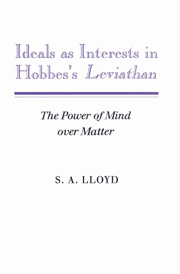Book contents
- Frontmatter
- Contents
- Acknowledgments
- A note on references
- Introduction
- 1 The standard philosophical interpretation
- 2 Hobbes's compositive reconstruction, phase one: identification of the principle of political obligation
- 3 Compositive reconstruction, phase two: religion and the redescription of transcendent interests
- 4 Hobbes's mechanism for the reproduction of social stability
- 5 Hobbes's resolutive analysis, phase two: part 4 of Leviathan
- 6 Theory in practice: Leviathan and Behemoth
- 7 Hobbes's resolutive analysis, phase one: design and detail
- 8 The treatment of transcendent interests
- 9 Hobbes's absolutism
- Notes
- Index
3 - Compositive reconstruction, phase two: religion and the redescription of transcendent interests
Published online by Cambridge University Press: 08 January 2010
- Frontmatter
- Contents
- Acknowledgments
- A note on references
- Introduction
- 1 The standard philosophical interpretation
- 2 Hobbes's compositive reconstruction, phase one: identification of the principle of political obligation
- 3 Compositive reconstruction, phase two: religion and the redescription of transcendent interests
- 4 Hobbes's mechanism for the reproduction of social stability
- 5 Hobbes's resolutive analysis, phase two: part 4 of Leviathan
- 6 Theory in practice: Leviathan and Behemoth
- 7 Hobbes's resolutive analysis, phase one: design and detail
- 8 The treatment of transcendent interests
- 9 Hobbes's absolutism
- Notes
- Index
Summary
The most frequent praetext of sedition and civill warre in Christian common-wealths hath a long time proceeded from a difficulty, not yet sufficiently resolved, of obeying at once, both God, and man …
–Hobbes (L 321)To this point, we have reconstructed the portion of Hobbes's compositive argument presented in Part 2 of Leviathan. There Hobbes attempts to identify a principle of political obligation that could, if generally followed, ensure the perpetual maintenance of effective social order. That principle is that one is to obey one's extant effective political authority in all of its commands not repugnant to one's duty to God. Hobbes then offers arguments both from narrow prudence and from morality for subjects to adhere to that principle.
But recall that Hobbes is engaged in the project of providing everyone with a sufficient reason to adhere to a principle which could, if generally followed, ensure the perpetual maintenance of effective social order. This requires, in part, that he provide people with reasons for adhering to his principle linked to the satisfaction of all of their most important interests; and also that he so specify his principle that it can be shown actually to be one that, if generally followed, could ensure perpetual domestic stability. To this point in the argument, Hobbes has not dealt with one crucially important set of interests – religious interests; there has as yet been no argument that people have any religious reason for affirming Hobbes's principle of political obligation.
- Type
- Chapter
- Information
- Ideals as Interests in Hobbes's LeviathanThe Power of Mind over Matter, pp. 99 - 157Publisher: Cambridge University PressPrint publication year: 1992



